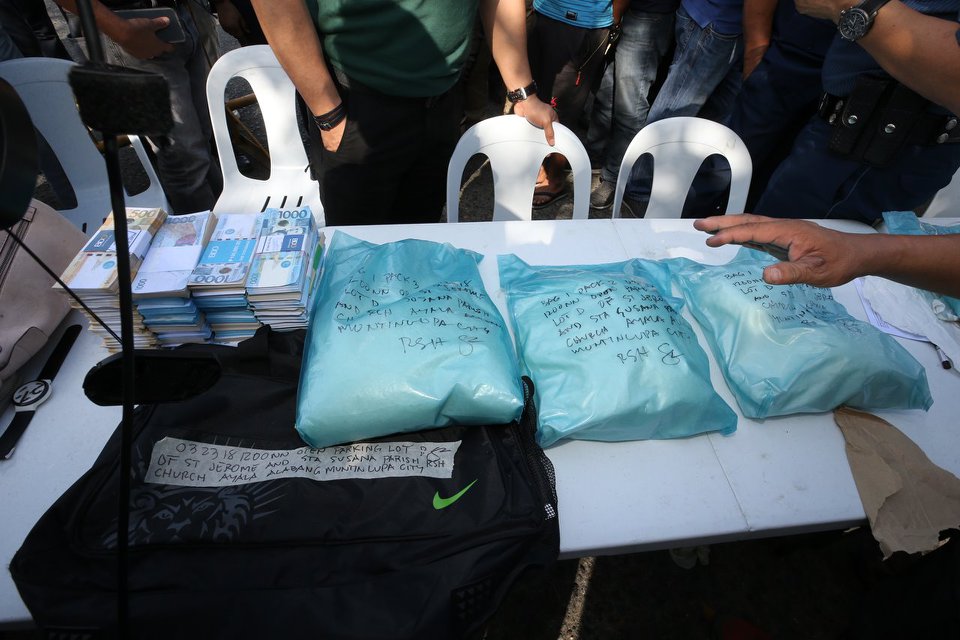News
Gov’t winning drug war via ‘3-pronged strategy’

Carreon said PDEA, as the lead agency against illegal drugs, adopted a three-pronged strategy in the national anti-drug campaign which focuses on reducing its supply, demand, and harmful effects. (File Photo: Philippine National Police/Facebook)
MANILA — The government’s adoption of a three-pronged strategy to address the illegal drug problem in the country has resulted in a victory, the Philippine Drug Enforcement Agency (PDEA) said Friday.
“We are freeing every barangay from illegal drugs. We are turning citizens to become resistant to drug abuse. We are transforming the negative impacts into positive opportunities for drug offenders. We are winning the drug war,” PDEA spokesperson Derrick Carreon said in his presentation during the launch of the Duterte Legacy campaign at the Philippine International Convention Center (PICC) in Pasay City.
Carreon said PDEA, as the lead agency against illegal drugs, adopted a three-pronged strategy in the national anti-drug campaign which focuses on reducing its supply, demand, and harmful effects.
He said the supply reduction strategy aims to take illegal drugs away from the people through anti-drug operations and arrest of drug personalities.
“For this strategy, PDEA (other law enforcement agencies) conducting high impact operations and arresting high-value targets,” Carreon said.
Authorities, he added, dismantled a total of 419 drug dens and 14 clandestine shabu laboratories from July 2016 to November 2019.
In the same period, the total amount of PHP40.39 billion worth of seized illegal drugs included the PHP31.25 billion worth of shabu.
Based on the Real Numbers data, authorities also arrested 220,728 persons involved in illegal drugs.
Included in the total figure are 726 government workers — including elected officials and employees, and uniformed personnel.
Of the arrested persons, 8,185 of them are high-value targets while 2,799 children involved in illegal drug activities were rescued during the anti-drugs operations.
Around 151,601 anti-illegal drug operations were launched by joint law enforcement agencies during the period.
As of November 2019, the consolidated report showed that 5,552 drug suspects have died in the anti-illegal drug operations.
A total of 485,295 drug surrenderers attended and completed recovery programs.
Carreon, on the other hand, said the demand reduction strategy was applied through advocacy campaign activities, including lectures, seminars, conferences, and film showing.
“A total of 277,973 anti-drug lectures seminars, symposiums, film showings, photo exhibits, campus tours throughout the country from June 2016 up to December 2019. As a result, over 309 million audiences were reached by the preventive education and community involvement and multi-media activities of the agency,” he said.
Meanwhile, Carreon said the PDEA introduced a harm reduction strategy to mitigate the negative effects of drug abuse.
“This approach prevents further distress and harm to the users, and provides them with positive opportunities,” he said.
Carreon said PDEA is implementing harm-reduction efforts such as “Balay Silangan”, a community-based reformation program for surrendering drug offenders which launched last April 2018; Project: “Sagip Batang Solvent”, to rescue street children, particularly those hooked on solvent-sniffing; drug test of public transport drivers nationwide, to ensure road safety; and “Drug-Free Workplace Program”, to promote a working environment free from the influence of dangerous drugs in business establishments.
As of December 2019, there were 92 Balay Silangan Reformation Centers were inaugurated nationwide. The centers have catered to 1,689 clients, 1,144 of whom graduated, while 68 were employed.
Carreon said 82 children hooked on solvent-sniffing were rescued from the streets.
On October 23 and Dec. 9, 2019, moving up ceremonies were held for the 57 children who have completed the first level of the reformation program.
Carreon said aligned with President’s vision of a drug-cleared country by 2022, PDEA intensified the implementation of the Barangay Drug Clearing Campaign.
“As of December 2019, 17,8006 out of the 42,075 barangays (villages) in the country have been declared drug-cleared upon the completion of the requirements set forth by Dangerous Drugs Boards Regulation No.3 Series of 2017,” he noted.





















